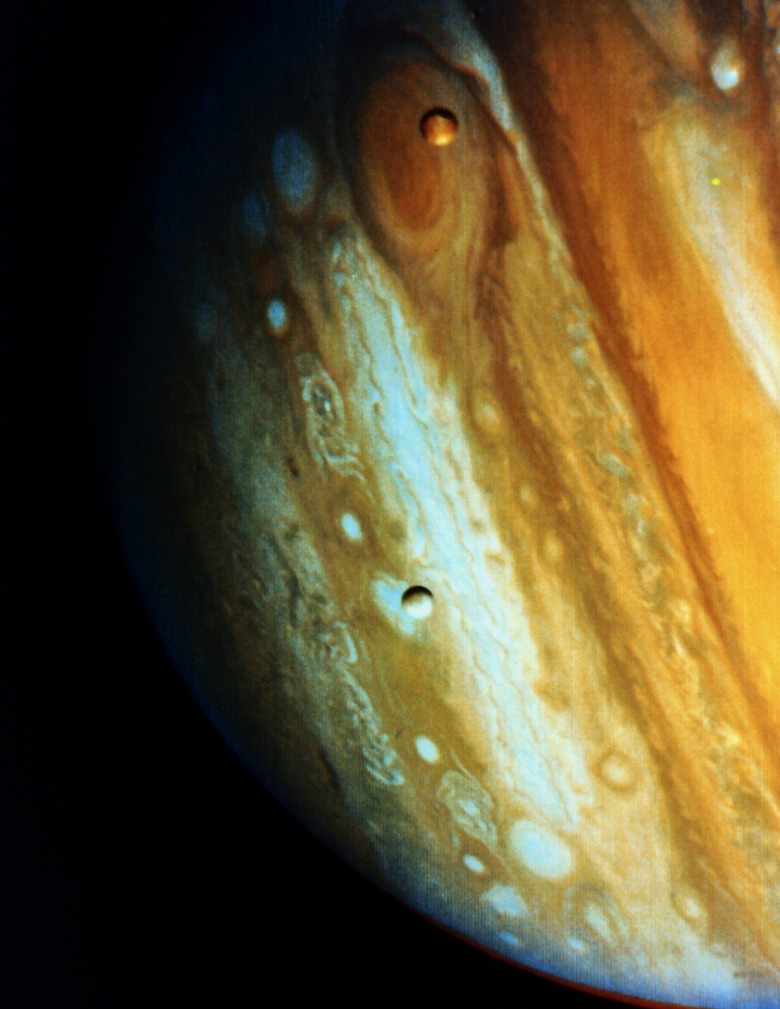Jupiter's Core Vs. Earth's Core
After their formation about 4.6 billion years ago, the planets in our solar system developed a layered structure in which the densest materials sank to the bottom and the lighter ones rose to the surface. Although the Earth and Jupiter are very different planets, they both possess hot, heavy cores under enormous pressure. Astronomers believe Jupiter's core consists mostly of rocky material, whereas the Earth's is made of nickel and iron.
Size and Mass
Size and Mass
The Earth's core has an outer layer 2,200 km (1,370 miles) thick and an inner zone 1,250 km (775 miles) thick. With an average density of about 12,000 kg per cubic meter, the core weighs in at 657 billion trillion kilograms (724 million trillion tons). The size of Jupiter's core is less accurately known; it is believed to be about 10 to 20 times the size of the Earth, or about 32,000 km (20,000 miles) in diameter. The core's density is estimated at 25,000 kg per cubic meter, which would give Jupiter's core a mass of 137 trillion trillion kilograms (151 billion trillion tons).
Composition
Composition
Earth's core consists largely of nickel and iron; the outer region is liquid and the inner part is solid. The liquid outer part flows around the inner core with the Earth's rotation, generating a magnetic field that shield's the planet's surface from certain kinds of solar radiation. Although the late author Arthur C. Clarke speculated that the core of Jupiter might be a huge diamond formed by great pressure, most astronomers believe it is made of heavy, rocky material present when Jupiter was first formed. Immediately surrounding Jupiter's relatively small inner core is a layer of hydrogen 40,000 km (25,000 miles) thick, squeezed into a metallic state that conducts electricity. Hydrogen acts as a metal only under the enormous pressures encountered at the planet's center.
Pressure
Pressure
The pressure at a planet's core is caused by the weight of all the material above it pressing down under the force of gravity. At Jupiter's core, the pressure is estimated at 100 million atmospheres, or 735,000 tons per square inch. In comparison, the Earth's core sustains a pressure of 3 million atmospheres, or 22,000 tons per square inch. To put this in perspective, the pressure at the bottom of the Mariana Trench, the deepest part of the Pacific Ocean, is a "mere" 8 tons per square inch. At these extremely high pressures, matter takes on strange properties; diamond, for example, may become a liquid metallic substance, pooling into gigantic "oceans" inside the larger planets.
Temperature
Temperature
At the Earth's core, temperatures reach 5,000 degrees Celsius (9,000 degrees Fahrenheit). Scientists believe the core's heat comes from two sources: Ancient meteor impacts and radioactive decay. During the Earth's formation, the solar system had more debris than it has now. Meteors struck the planet at a very high rate; many of these impacts were equivalent to millions of hydrogen bombs, leaving the Earth in a molten state for millions of years. Although the surface has since cooled, the inner layers are still liquid or semi-liquid. Radioactive thorium, uranium and other elements still present in the core continue to generate large amounts of heat, helping keep the planet's center hot. Jupiter's core temperature is thought to be about 20,000 degrees Celsius (36,000 degrees Fahrenheit). Jupiter appears to still be contracting as part of its formation process. As it contracts, the gravitational energy of material falling towards the center releases heat, contributing to the core's high temperature.
References
- U.S. Geological Survey: Inside the Earth
- University of Oregon: Jupiter
- NASA: Get a Straight Answer: A Diamond Core for Jupiter?
- University of Oregon: What is the Best Estimate of the Densities of the Various Layers of the Earth?
- Deep Sea Challenge: The Mariana Trench
- Princeton University: Impact study: Princeton Model Shows Fallout of a Giant Meteorite Strike
Cite This Article
MLA
Papiewski, John. "Jupiter's Core Vs. Earth's Core" sciencing.com, https://www.sciencing.com/jupiters-core-vs-earths-core-21848/. 24 April 2017.
APA
Papiewski, John. (2017, April 24). Jupiter's Core Vs. Earth's Core. sciencing.com. Retrieved from https://www.sciencing.com/jupiters-core-vs-earths-core-21848/
Chicago
Papiewski, John. Jupiter's Core Vs. Earth's Core last modified March 24, 2022. https://www.sciencing.com/jupiters-core-vs-earths-core-21848/
